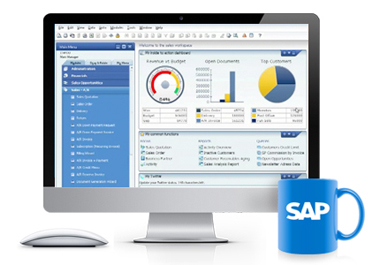Business Leaders Believe an ERP System is an Indispensable Organizational Asset
The phrase Enterprise Resource Planning and its acronym, “ERP”, began to gain popularity over twenty years ago in the realms of manufacturing and engineering. As time passed, the scope of ERP expanded into many other disciplines such as accounting, maintenance and human resources. By the mid”“1990s ERP systems were capable of dealing with all significant functions of an enterprise. Further, governments and non”“profit organizations also began to use ERP systems. So, implementation of those systems became commonplace.
ERP systems initially dealt with automating back office activities which did not directly impact customers and/or the general public. However, “front office” functions, such as customer relationship management (CRM), dealt directly with customers, or e”“business systems such as e”“commerce, e”“government, e”“telecom, and e”“finance””or supplier relationship management (SRM) became integrated later, when the Internet simplified communicating with external parties.
“ERP II” entered the lexicon in the early 2000s. It describes web”“based software that provides employees and partners (such as suppliers and customers) with real”“time access to ERP systems. The ERP II role expands traditional ERP’s resource optimization and transaction processing. Rather than just manage buying, selling, etc., ERP II optimizes information in the resources under its management so as to assist the enterprise collaborate with other enterprises. Further, ERP II is more flexible than the first generation ERP. Instead of limiting ERP system capabilities within the organization, it extends the enterprise’s walls in order to interact with other systems. Such systems are known as Enterprise Application Suites.
ERP systems integrate internal and external management of information across an entire organization””embracing finance/accounting, manufacturing, sales and service, customer relationship management, etc. ERP systems automate this activity with an integrated software application. ERP facilitates information flow between all business functions inside the organization, and manages connections to outside stakeholders.
Enterprise system software is now a multi-billion dollar industry that produces components that support a variety of business functions. IT investments have become the largest category of capital expenditure in United States-based businesses over the past decade. Enterprise systems are complex software packages that offer the potential of integrating data and processes across functions in an enterprise.
The main example is ERP systems. Organizations consider the ERP system to be their backbone and an indispensable organizational asset, because it integrates varied organizational systems, and enables flawless transactions and production. However, an ERP system is radically different from traditional systems development, because ERP systems can run on a variety of computer hardware and network configurations, typically employing a database as a repository for information.
Do you Have an ERP System for Your Growing Small or Midsized Manufacturing, Wholesale Distribution, and/or Online Retail Business, that Helps you Improve Profit Margins, and Respond to Market Needs Faster? Using Better Software, Tools and Technology can Make all the Difference.
For your own personalized Business Analysis, contact us at 813-321-1300.
Manufacturers, Wholesale Distributors and Online Retailers Rely on Cornerstone for Automated Enterprise Resource Planning (ERP) Systems of Financial Accounting, CRM, MRP, Inventory Control/Tracking, Bar Codes and Scanning, EDI, Warehouse Management, Web Apps, Advanced Technology Solutions and IT Support
Why do so many growing Manufacturing, Online Retail and/or Wholesale Distribution businesses located in FL, as well as companies located through out the U.S., rely on Cornerstone for ERP systems, related services and technical support? As an award-winning Top Value Added Reseller and SAP Gold Partner, simply stated, our expertise is superior. Cornerstone Consulting has been providing state-of-the-art business software systems, as well as related technical support, to small and midsized manufacturing and wholesale distribution enterprises for more than thirty years.
Cornerstone Consulting’s areas of expertise include, but are not limited to:
- SAP Business One
- SAP HANA
- E-commerce
- M-commerce
- Mobility
- Business Intelligence (BI)
- Business Analytics
- Internet
- Bar codes and Scanning
- EDI
- Databases
- Cloud Computing
- Custom Programming
- Strategic Marketing
- Software as a Service (SaaS)
- Web Development
If you’re looking for a performance-driven software and technology consulting, web development, and IT firm specializing in business automation and optimization, you’ve found your dream team. You can rely on Cornerstone to provide outstanding software products, related services and technical support for all areas of your small or medium sized business, such as: financial accounting, operations, customer relationship management, sales, inventory control and tracking, warehouse management, e-commerce, and more. Cornerstone’s highly-skilled programmers, trainers and consultants specialize in providing our Manufacturing, Wholesale Distribution, and Online Retail clients with optimal business process configuration, integration and automation.
Enterprise Resource Planning (ERP) Business Needs Analysis
Thinking about making your business highly competitive? We’d like to hear your ideas concerning re-engineering your operations with cutting-edge software and technology. We’re excited to discuss how your small or medium enterprise (SME) can not only run better but also out-smart your competitors.
Call us today at 813-321-1300!
No time to call us now? No worries ““ we know you’re busy. If you’d like, you can complete the brief form within the Contact Cornerstone page, and let us know a good time to contact you in the near future. We’ll touch base with you when it’s convenient for your schedule. We’re looking forward to connecting with you!


